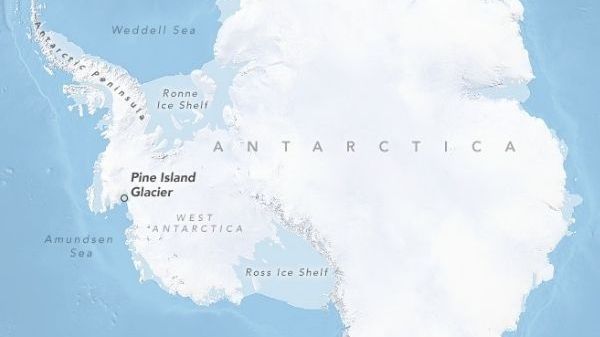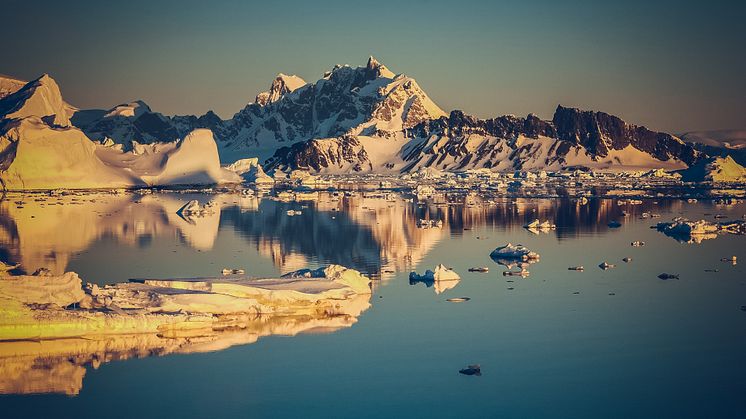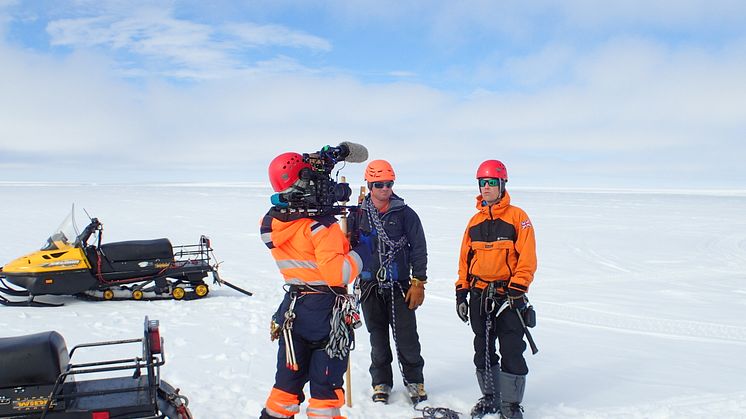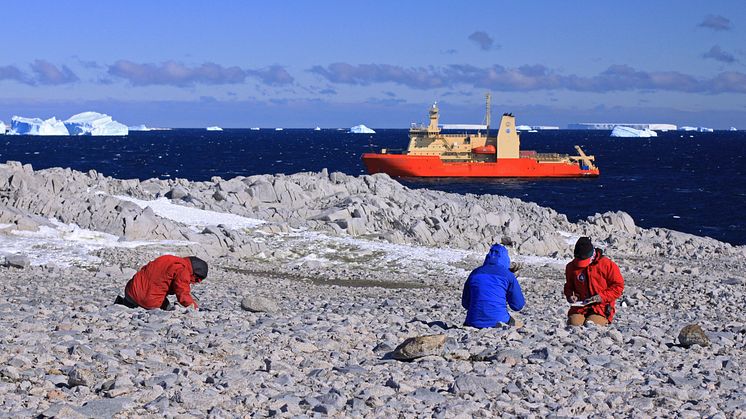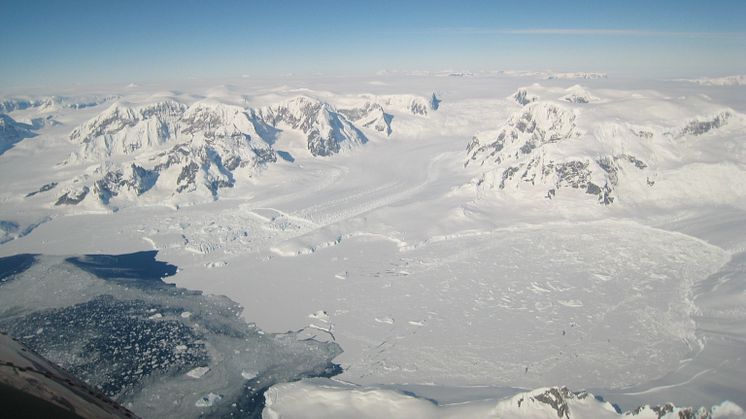
Press release -
Major Antarctic glacier passed a tipping point in the last 80 years, research reveals
Pine Island Glacier in West Antarctica has gone through an irreversible retreat, passing a tipping point within the last 80 years, researchers have found.
The findings, which are published in the influential journal Nature Climate Change, have emerged when world leaders gather in Dubai to debate the impacts of climate change at the COP28 conference.
While numerical model simulations have been used for some time to study the behaviour of glaciers and ice sheets, researchers from Northumbria University and Bangor University combined these for the first time with real-world satellite observations to identify whether a tipping point has been crossed in the past.
They have now been able to confirm that Pine Island Glacier underwent a rapid, unstable retreat at some point between the 1940s and 1970s, leading to an irreversible loss of ice over several decades.
Pine Island Glacier, together with its neighbour Thwaites Glacier, have been called the ‘underbelly’ of the West Antarctic ice sheet. Pine Ice Glacier is one of the fastest flowing outlets of ice in West Antarctica and has contributed more to global mean sea-level rise in recent decades than any other Antarctic glacier.
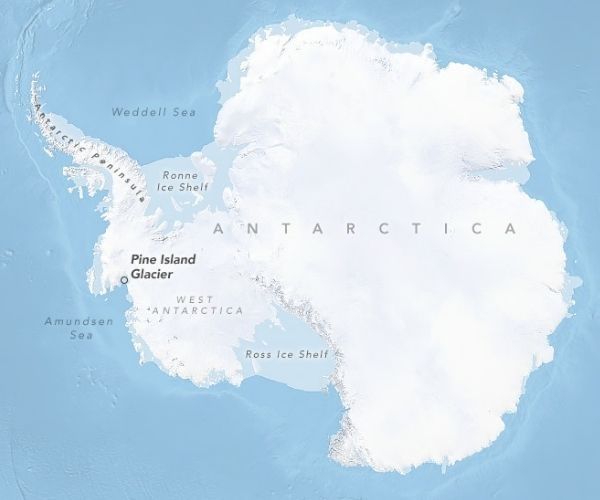
Between the 1940s and 1970s the glacier, which was 40km more advanced than its present-day position, detached from a seabed ridge. It underwent a rapid retreat until it temporarily stabilized on a shallow part of the seabed in the late 1980s.
The researchers believe that a period of warm ocean temperatures would have been sufficient to cause melting beneath the glacier, forcing it to retreat from its long-term position on the ridge.
While their study suggests that this accelerated phase of mass loss may now have come to a halt, their results indicate that by the early 1970s the glacier had retreated to a point where it could not recover its original mass and position during colder conditions. This confirms that the glacier’s retreat during this period is irreversible, meaning it has passed a tipping point.
The researchers also applied their numerical model to predict the future behaviour of the glacier in a separate study and have found that it will again enter periods of rapid retreat unless global warming is kept within limits.
Dr Brad Reed, a Research Fellow in Ice-Ocean Modelling at Northumbria University, began the research whilst undertaking his PhD at Bangor University. He said: “The implications for the future are clear. What has happened in the past can happen again.
“Our ability to model past changes as the glacier passed a tipping point, provides us with an added confidence in our future predictions. But it is worrying that our model predicts further irreversible and fast periods of mass loss from this same region in the future unless we can halt global warming.”
He added: “Whilst the phase of retreat that we modelled may have finished, we cannot rule out similar irreversible mass loss from this part of the ice sheet in the near future and we should not risk the consequences associated with these types of retreat and mass loss.”
Professor Mattias Green, Professor of Oceanography in the School of Ocean Sciences at Bangor University, said: “The investigation highlights the important interactions between the ocean and the glaciers in Antarctica. The trigger of the historical retreat was possibly an episode of warm ocean water entering the area of Pine Island Glacier, and even when conditions returned to the cold state, the retreat continued. This is quite concerning for the future state of Pine Island Glacier and its neighbours in a warming world.
“It also stresses that investigating past behaviour of the Antarctic ice sheet can give us insights into how it will respond in the future, and it gives us confidence in our ability to predict those responses.”
Northumbria University has one of the world’s largest groups of glaciologists studying the interactions between ice sheets and oceans. Hilmar Gudmundsson, Professor of Glaciology and the academic lead of the University’s The Future of Ice on Earth group, co-authored the study. He warned that it was potentially a case of luck that the glaciers’ retreat stabilised after a few decades of ice loss due to the topography of the bedrock under the Amundsen Sea.
“This study is about understanding the causes for recent changes in this area, and what we can expect next. The irreversible behaviour of the glacier we see in those simulations, is also seen in our future predictions,” he said.
“The implication is that we should be thinking about ice loss from this part of the world not in terms of a gradual measured response to global warming, but as something that, when pushed too far, loses ice on its own accord at an accelerated rate.
“This time the result was that over a period of a few decades the glacier became the biggest contributor of the Antarctic Ice Sheet to sea level rise. What our models suggest is that passing further tipping points of Pine Island Glacier will cause even larger loss of ice. In that sense, this time we may have got lucky.”
The paper Recent irreversible retreat phase of Pine Island Glacier is now published in Nature Climate Change.
Researchers from Northumbria University are leading major studies assessing changes in Antarctica, including TiPACCs (Tipping Points in the Antarctic Climate System). This £4 million project is investigating the probability of sudden and large changes in the sea-level contribution from the Antarctic Ice Sheet due to crossings of tipping points in the marginal seas and the grounding lines of the floating ice shelves that fringe the ice sheet.
Topics
Categories
UNIVERSITY OF THE YEAR 2022 (Times Higher Education Awards)
Northumbria is a research-intensive university that unlocks potential for all, changing lives regionally, nationally and internationally. Find out more about us at www.northumbria.ac.uk
--- Please contact media.communications@northumbria.ac.uk with any media enquiries or interview requests ---








